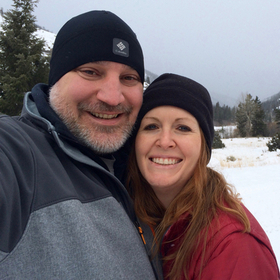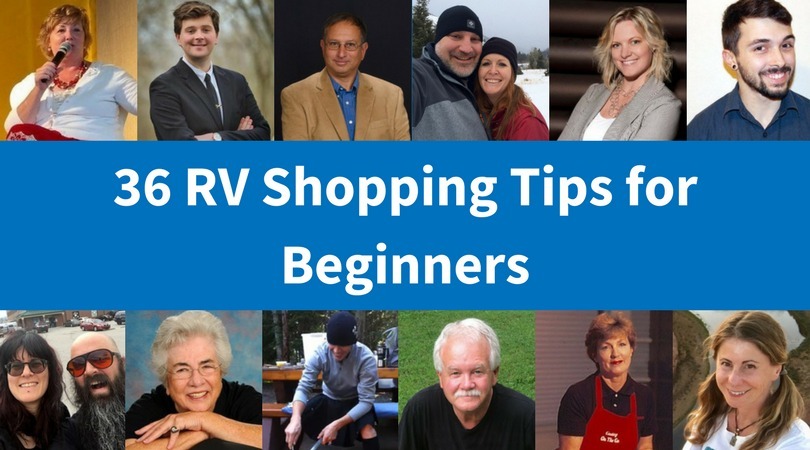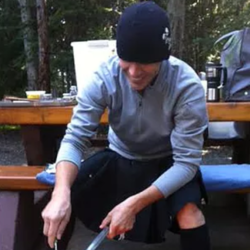Living in an RV is awesome. It gives you the possibility to travel and move wherever you want. You don’t have to spend any more money on hotels, flights or train tickets. When you have an RV, you can take all your things and the comfort of your home in your trips. Such freedom is priceless. An RV is like a home on wheels. For some, it can be a vacation home that they use on the weekends and holidays, while others live full-time in an RV.
No matter how much time you spend in your RV, this is an important purchase. Buying an RV is much different from buying a regular car. There are many things to which you need to pay attention to get the best value for your RV. You can research online to learn more about how it is to live in an RV and what to expect. Still, the best thing is to find out what experienced RVers have to say about their lifestyle. It’s much better to learn from other people’s mistakes, than from yours.
The goal of our expert roundups is getting more RVers to reply to your most frequent questions. For this post, we reached out to 12 experienced RVers and asked them the following question:
“What are your top 3 RV research and shopping tips that you wish you knew when you started?
We received some great tips that I am sure you are going to love. Keep reading this post to find out what they are.
Grant Sinclair – Wander-Filled Life

1. Don’t shop brands, shop RV floor plans. There are only so many ways to cram everything into an RV. Find the floorplan that fits your needs the best and then check out the various RV manufacturers for which bells and whistles you want.
2. Buy your second RV first. A lot of shoppers go into buying an RV for the first time thinking they will get something bigger later. RVs always lose value, so that is a losing proposition.
Buy the RV which you will be comfortable in from the beginning.Click To Tweet3. Be prepared to travel to get the best price. We were looking for a particular model and found it at a local dealer. We drove over and looked at the model. I checked the price online and found it significantly cheaper about 90 miles away. The dealer I was at would not budge on the price, so we got in the car and headed to the other dealer. We ended up getting a great deal… so good, in fact, our insurance company had to charge us more than originally quoted because the replacement value was so much more than we paid.
Laura Nunemaker – VeganRV
We’ve been living and traveling in our RV for over a year now. Here are our top 3 RV research and shopping tips we wish we knew when we started:
1. You can go smaller than you think you can. Before you’ve lived that small, you’re stuck on “how am I going to fit all my stuff into such a small space?” But after living in an RV for a while you realize that you don’t need most of that stuff and you can indeed live in a smaller space easily. A smaller rig will also open up more campsite options for you. We love our 34′ Winnebago, but now realize we could certainly go smaller.
2. We knew this, but many people don’t. Getting a brand new RV does not guarantee you won’t have any problems with it. New RVs are pretty much guaranteed to have problems, some that will require warranty work. If you look at 1-2-year-old RVs, the owner before you may have taken care of all of those problems. Ask about warranty repairs. If there haven’t been any, that’s a red flag. The sweet spot for fewer problems is in the 2-4-year-old range.
3. Before you tackle an RV that's older or needs work, understand that there's a great shortage of RV repair shops.Click To TweetIf you have repairs that require a professional, you will likely need to make an appointment a month out and they will probably keep your RV for a week or more. This can be hard to work around if you are living in the RV and traveling.
James Wes – The Kilted Tech RV Repair
1. Whether buying used RVs or new you still have to be concerned about the coaches integrity. Even buying new does not necessarily mean the coach is fine, even new coaches could already be leaking from the factory this can and does happen when a coach sits on a lot it is not always checked and water damage can occur, we call this “lot rot”.
Even buying a new coach it could be water damaged and the dealerships will not disclose this. To protect yourself we recommend purchasing a $50-$90 moisture meter and check the interior. Water leaks are the most expensive repair you could incur. A front wall rebuild could be around $3000. Roof replacements are on average $4000-$7000.
To avoid these high costs routine maintenance is absolutely mandatory. It starts with a sealant inspection recommended every 6 months. We recommend mid-fall to make sure its ready for winter storage and mid-spring to make sure that the sealants have survived winter storage and therefore any issues that may have arisen can be taken care of quickly before repair shops get into their busy seasons. A sealant inspection takes approximately an hour for most coaches.
2. New vs. Used: When purchasing from an RV dealership the first thing to know is that sales profits are much higher on a used coach (motorhome, travel trailer or camper) than a new one because the coach came in as a trade in and the dealerships do not invest much into the coach. New coaches incur more interest on the companies loan for having the coach on the sales lot. This added cost is passed on to you, the customer. With this in mind, you have more leverage negotiating on a used coach vs. a new one
3. The lifespan of a coach these days is only about 15 years. Rubber roofs have the same lifespan. With routine maintenance, you can extend the lifespan. With less maintenance the lifespan is shorter and will involve more costs. We can’t stress enough maintenance, maintenance, maintenance!
Annual maintenance of an RV should include a budget of approximately $1000 on average.Click To TweetThis will cover costs of brakes, bearings, bushings, sealant work, a propane gas test and general wear and tear repairs, etc. This would not include renovations or customization.
Alan Sills – RV Across America
Live & Learn…
1. I had NO idea how much damage a blowout could cause on a RV – with NO loss of control or accident. If and WHEN the tire blows out and shreds, if your camper does not have a steel plate above the tires, the shredded tire will likely enter the interior of your RV. Once this happens, it can tear up wiring, propane lines and more. Now I know most manufacturers put poor quality tires on their campers – just to save a few bucks. Moral of the story is to buy better tires immediately if buying new.
2. If you full time, bigger is better, right?? Not so much.
There are MANY great campsites that are simply unable to accommodate campers over 30 - 35 ft.Click To Tweet Wish I knew that before I bought a 5th wheel I planned to live in! My new camper is 34′ 11″ and I’ll never exceed 35 ft. again!You may be interested in:
- Top 5 Best Bunkhouse Travel Trailers For Campgrounds
- Top 5 Best Travel Trailers For Campgrounds
- Top 5 Best Small Motorhomes For Campgrounds
- Every New RV 35′ or less
3. Quality trumps all – and is all too rare in the camper world! Many (most) manufacturers use substandard materials and/or take shortcuts during the design/engineering/construction process. The result? A camper that spends more time getting fixed than being used. Now I know there ARE a few really quality companies that build a superior product.
Chuck Woodbury – RV Travel
There were a couple of things I wish I knew when I started out, as a starving freelance writer, exactly when my motorhome would break down next so I could hustle an assignment to pay for repairs.
The only other thing was I wish I knew that one should check for a leaky roof before buying a used RV.Click To TweetGeez. . . mine had water stains all over it, but I was too in love with the idea of being a roving reporter in a cozy little motorhome to pay attention.
Well, actually I did pay attention a little later at the first rainstorm when the initial drop of nice cold ice water beginning dripping on me in bed from the ceiling. Oh, no fun!
Bill Widmer & Kayla Blydenburgh – The Wandering RV
My top RV shopping tips:
1. Rent one of the type you’re considering before you buy. You can do it really cheap on RVShare. That will help you decide if you really like that model or not.
2. If you're buying used, definitely pay to have it inspected. It's a few hundred dollars, but it could save you thousands. Click To TweetIf they won’t let you, then keep looking.
3. Don’t be afraid to spend 30-60 minutes in a rig to get a feel for it before you buy. Use it like you would normally – lay in the bed, lay on the couch, stand in the shower, pretend to cook, etc. That will help you a lot when it comes to feeling out space and seeing whether it’s big enough for you.
Janine Pettit – Girl Camper
1. GoRVing.com and RVingPlanet.com are great resources for beginners and experienced RVers. These websites can help you find the right trailer for you, lead you to dealers in your area, connect you to campgrounds and inspire you with their micro-movies and blogs.
2. Take advantage of the RV podcasts out there. The Girl Camper Podcast, RV Family Travel Atlas Podcast, Campground of the Week and the RV Entrepreneur all have useful information on how to get started RVing.
3. There are great YouTube videos out there that really inform and educate consumers.Click To TweetRV Education 101 by Mark Polk is my favorite. Mark is an industry expert with decades of experience and any questions you have about the RV lifestyle have been covered by Mark on his channel and website.
Margo Armstrong – RV Lifestyle Experts
Here are my three suggestions for researching and shopping for your first RV:
1. Use the major online RV sales websites to find three RVs that conform to your layout requirements, and price range.Click To TweetWrite down the year, make and model of all three vehicles. Visit NADA.com to find the current resale value of each of these RVs.
2. Search your local area for RV sales lots that have at least one of these on your list. Visit the sales lot and take a tour. Do not plan on purchasing at this point. Spend time in each RV, sit on the couch and the dinette, imagine yourself cooking in the kitchen. Laydown on the bed, stand in the shower, walk around the RV and look at the amount of storage.
You may have to travel to another part of your state to find the opportunity to do your research. Do not panic, take your time as this purchase is like buying a house. This is important to your enjoyment of the RV lifestyle, make sure it fits your needs.
3. When you find the one RV that is right for you (even if long distance), get the VIN number and use the search engine at National Highway Traffic Safety (NHTSA.gov) to look for any manufacturer’s recalls. This website covers all makes and models from 2012 to current year. If no recalls display for that year, make or model, it is probably safe to drive.
But just to be sure, before you sign on the dotted line, have it inspected by a Certified RV Inspector (NRVIA.com) or a local RV repair person.
Follow these three steps to make sure you get the most out of your RV lifestyle. Happy travels!
Jake Antill – RoadTrek
1. Do your research — think about where you will park your rig, will it be dry and protected from the elements?
2. Ask what work has been done, by whom and when — this will give you a ballpark of the general upkeep costs and of the state your caravan is in
3. Have an inspection. Get a mechanic to look over the rig to make sure everything's in order.Click To TweetKelly Beasley – Camp Addict
I have been full-time RVing in my 24’ travel trailer for about 2.5 years. I am not much of a consumer. In fact, I have become a minimalist since full-time RVing, and want to get a smaller RV. That said, there are a few things I wish I would have known before I got my first RV. Here are some tips that should keep you from making the same mistakes I did.
1. RV Salesmen: Some of them are less informed when it comes to technical things such as the GVWR, tongue weight, or how much it can tow. (When I bought mine, I asked how much the tongue weight was, and he was puzzled as to why I was asking. Made me feel like I was being ‘overly cautious’ about the stats of the RV.) That was my experience. Hope you have better luck and find a good RV salesman.
Hopefully, you will go in knowing more about the RV you are interested in than they could even possibly tell you. Hopefully, they can at least tell you if it’s a 30 amp RV or a 50 amp RV. But beyond that, it’s best to do your own research before or after you look at the RV you are interested in. Most of the time, all of the technical data you need is online from the manufacturer.
2. Wait before you buy ‘all the RV things’: I thought I would need this, that and that other thing, too. Turns out, I ended up becoming a full-time boondocker, so I had no use for my electric fan, electric heater, extra dogbones, Passport America membership (didn’t use it even ONCE), and more. I could have saved a lot of money had I not bought those things right off. I should have waited to SEE what I really needed. Of course, there are definitely things you HAVE to start off with, such as a sewer hose (unless you have a composting toilet).
Best to wait until you know for sure what kind of camping you will be doing before you decide what all you really need for it.Click To Tweet3. New AND used RVs can have issues: Yes, you read that right. It doesn’t matter if you purchase new, your rig can still come with a MULTITUDE of problems. I purchased used (4 years old) and was pretty lucky compared to friends of mine. I have friends who bought used with massive problems, and new with massive problems.
So don’t base your purchase decision between new or used on dependability. Best bet is to read the RVingPlanet RV reviews or use RV.org, a nonprofit and independent site which rates RVs. When you know what year of an RV you want to buy, you can get their consumer ratings on it.
That’s about it. Good luck with your RV purchase!
(Note from Minuca: Don’t let yourself discouraged by Kelly’s particular experience with the salesman from which she bought her RV. There are plenty of great RV salesman out there that are helpful and know everything you need about RVs.)
Janet Groene – Solo Woman RV
1 Observe any RV show or sales lot and you’ll see that most shoppers overlook the most obvious need in an RV and that is to be safe on the highway. Look beyond the paint scheme. Shop for fuel economy, handling, payload, visibility, suspension, and driver assist options.
2. Shop for an RV that will accommodate you or your family, not just 'sleep' them.Click To Tweet3. To be totally independent on the highway, one needs a bathroom. Otherwise, you’re dependent on public facilities on the road and in campgrounds.
Shona Mackin – Bailey New Zealand
When purchasing ensure you buy from a trusted RV dealer to ensure you get a full handover and there is a commitment to after-sales service. You will need access to advice if you are new to caravanning and also to parts and accessories. Also, it’s good to know the warranty of the product.
Consider carefully how you will use the caravan? Will the layout suit your needs? Is the length an important priority for storage? What is the budget?
Another consideration is what about the tow vehicle? If you plan to use a current vehicle is it suitable for the weight of the caravan?
There are some great lightweight easy to tow and easy to park options.Click To Tweet
That’s a wrap. Hope you enjoyed reading this post. As we have seen, it’s essential to do your homework and find out as much as you can about RVs and RVing, including some technical aspects. This will help you avoid certain issues and save you thousands of dollars.
If you want to start RVing but you haven’t yet, feel free to ask us any questions in the comments below and someone from our team will help you out.
What is your favorite RV shopping tip?













